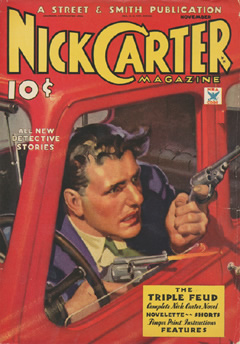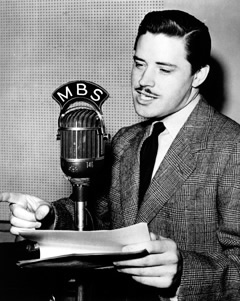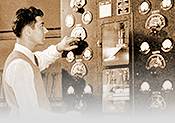The following article, written by radio historian Elizabeth McLeod, is presented in celebration of the anniversary of the radio premiere of Nick Carter, Master Detective on April 11, 1943.
Over the course of Radio's Golden Age practically all of the leading characters of popular culture found their way to the microphone at one time or another. Some received red-carpet treatment in glossy, high-class productions featuring big name stars, others were tossed off in a desultory manner with no-budget syndicated productions, and some went from one extreme to another. But most of these characters found their radio presentation in the comfortable middle ground -- in the realm of solid production, writing, and acting, neither flashy nor slapdash.
 Such was the destiny of Nick Carter, Master Detective -- the most popular character of the dime novel days of the late nineteenth and early twentieth century, and a solid figure down through the pulps of the 1930’s. While detective radio programs enjoyed a strong vogue in the first years of the thirties, Nick himself -- who remained, for his entire career, under the copyright protection of Street and Smith Publications -- would have to wait till the forties before facing the mike for the first time. And, when he finally did, he'd bear the unmistakable mark of the dramatic department at WOR in New York.
Such was the destiny of Nick Carter, Master Detective -- the most popular character of the dime novel days of the late nineteenth and early twentieth century, and a solid figure down through the pulps of the 1930’s. While detective radio programs enjoyed a strong vogue in the first years of the thirties, Nick himself -- who remained, for his entire career, under the copyright protection of Street and Smith Publications -- would have to wait till the forties before facing the mike for the first time. And, when he finally did, he'd bear the unmistakable mark of the dramatic department at WOR in New York.
One of the co-owners of the Mutual Broadcasting System, WOR had long prided itself in the quality of its independent productions, maintaining a production staff to rival those of the major networks -- while operating on a fraction of their budgets. The key was in the choice of material: WOR avoided programming which demanded highly-paid star talent or elaborate production values, and also avoided the sort of outré experimentation that thrilled the critics but failed to attract audiences. Its bread and butter was always straight, mainstream drama -- with an emphasis on tales of crime, mystery, and adventure. That environment was made to order for the adventures of Nick Carter.
It also helped that WOR-Mutual had a satisfactory working relationship with Street and Smith Publications, as the production base for The Shadow since 1937. That series had all the classic hallmarks of a WOR production -- and it attracted both long-term sponsorship and a loyal weekly audience. With the successful track record of that program, it took little prodding to convince Street and Smith to at last license the rights for Nick Carter.
The property was turned over to just the right producer for development -- the burly, bearded Sherman "Jock" McGregor, who had recently fled the rigid halls of NBC for the greater freedom available at WOR. One of his first features for WOR-Mutual, the impressive Murder Clinic anthology series of 1942 brought an array of popular detectives to the air, demonstrating McGregor's strong affinity for the form. All of his series were marked by tight scripting, straightforward production values, and workmanlike casts, usually headed by a strong (but not highly paid) leading man.
A midwestern actor named Lon Clark was McGregor's choice for the title role in the Nick Carter series -- and again, the choice proved serendipitous. A Minnesota native who drifted into acting after a musical education, Clark was a veteran of another great independent production center -- the program department of "The Nation's Station," the powerful WLW in Cincinnati. His crisp, authoritative voice carried just the right no-nonsense tone for Nick, a detective who had no use for hardboiled purple prose or snappy wisecracks. But he could also be warm and engaging, which also suited Nick Carter -- whose dialogue with his friends and colleagues made up a large chunk of each episode's narrative. Nick never came across as pedantic or condescending as he outlined each week's crime to his associates -- and Clark brought these moments effectively to life. In the classic manner of WOR-Mutual leading men, he kept the focus of his performance on the character itself, not on using it as a vehicle to build his own star power.
 Nick's supporting cast was vital to the success of the program. Secretaries/Girl Fridays were among the most common associates for radio detectives, and Nick's assistant was a classic example. While in his dime novel and pulp magazine days, one of Nick's main assistants had been a streetwise newsboy named Patrick "Patsy” Walker, the radio series changed both the occupation and the sex of the character to create the dedicated, hard-working secretary Patsy Bowen -- inquisitive, and sometimes too nosy for her own good…single but never man-crazy…attractive, but not glamorous. Patsy did much of Nick's legwork in gathering facts and handling clients. And, it must also be noted, she filled the common role of damsel-in-distress, often falling into the clutches of the week's villain to await rescue. While often scoffed at by modern listeners, such a role was nevertheless essential to the plots, in that it introduced a necessary element of additional suspense as the story neared its climax -- and it often gave the villain a chance to soliloquize, explaining complicated aspects of his plan and clarifying them for listeners who might have overlooked the clues. As Patsy, two fine radio actresses divided the part, with Helen Choate originating the role, to be succeeded after three years by Charlotte Manson.
Nick's supporting cast was vital to the success of the program. Secretaries/Girl Fridays were among the most common associates for radio detectives, and Nick's assistant was a classic example. While in his dime novel and pulp magazine days, one of Nick's main assistants had been a streetwise newsboy named Patrick "Patsy” Walker, the radio series changed both the occupation and the sex of the character to create the dedicated, hard-working secretary Patsy Bowen -- inquisitive, and sometimes too nosy for her own good…single but never man-crazy…attractive, but not glamorous. Patsy did much of Nick's legwork in gathering facts and handling clients. And, it must also be noted, she filled the common role of damsel-in-distress, often falling into the clutches of the week's villain to await rescue. While often scoffed at by modern listeners, such a role was nevertheless essential to the plots, in that it introduced a necessary element of additional suspense as the story neared its climax -- and it often gave the villain a chance to soliloquize, explaining complicated aspects of his plan and clarifying them for listeners who might have overlooked the clues. As Patsy, two fine radio actresses divided the part, with Helen Choate originating the role, to be succeeded after three years by Charlotte Manson.
Aiding the central duo of Nick and Patsy, newspaper reporter Scubby Wilson, ably played for the run of the series by John Kane, brought the press angle into play. He often brought cases to Nick's attention through his journalistic activates -- and despite his two-fisted personality, his prodding and prying into criminal conspiracies often landed him firmly in the clutches of the week's antagonist...right alongside Patsy. A strong character in his own right, Scubby essentially functioned as a second male lead. He took a central role in stories in which he appeared, but he never rivaled Nick himself for intelligence or deductive ability.
Scriptwriting was always a key strength of WOR dramas, and Jock McGregor had an unerring ear for dialogue and plot. He wrote many episodes of Nick Carter, Master Detective himself, and those he did not write were scripted by many of the same authors who stood behind other outstanding WOR programs. Robert A. Arthur, one of the leading members of the station's writing staff, turned in a number of episodes, as did comic book and science fiction specialist Alfred Bester. Even Walter Gibson, creator of The Shadow, wrote his share of Nick Carter episodes.
All of these authors brought a distinct style to their scripts -- Arthur's episodes might tend toward straight suspense, Bester might send Nick into a science-fiction tinged milieu, and Gibson's tales might take on an edge of the fantastic -- but McGregor's close supervision of the program and its well-established house style ensured a consistent flavor. Listeners might never know what sort of trouble Nick Carter might find himself drawn into -- but they knew he would always remain Nick Carter. That consistency amidst diversity gave the program its greatest strength -- making it a fitting setting for one of popular culture's most enduring figures.

 Such was the destiny of Nick Carter, Master Detective -- the most popular character of the dime novel days of the late nineteenth and early twentieth century, and a solid figure down through the pulps of the 1930’s. While detective radio programs enjoyed a strong vogue in the first years of the thirties, Nick himself -- who remained, for his entire career, under the copyright protection of Street and Smith Publications -- would have to wait till the forties before facing the mike for the first time. And, when he finally did, he'd bear the unmistakable mark of the dramatic department at WOR in New York.
Such was the destiny of Nick Carter, Master Detective -- the most popular character of the dime novel days of the late nineteenth and early twentieth century, and a solid figure down through the pulps of the 1930’s. While detective radio programs enjoyed a strong vogue in the first years of the thirties, Nick himself -- who remained, for his entire career, under the copyright protection of Street and Smith Publications -- would have to wait till the forties before facing the mike for the first time. And, when he finally did, he'd bear the unmistakable mark of the dramatic department at WOR in New York. Nick's supporting cast was vital to the success of the program. Secretaries/Girl Fridays were among the most common associates for radio detectives, and Nick's assistant was a classic example. While in his dime novel and pulp magazine days, one of Nick's main assistants had been a streetwise newsboy named Patrick "Patsy” Walker, the radio series changed both the occupation and the sex of the character to create the dedicated, hard-working secretary Patsy Bowen -- inquisitive, and sometimes too nosy for her own good…single but never man-crazy…attractive, but not glamorous. Patsy did much of Nick's legwork in gathering facts and handling clients. And, it must also be noted, she filled the common role of damsel-in-distress, often falling into the clutches of the week's villain to await rescue. While often scoffed at by modern listeners, such a role was nevertheless essential to the plots, in that it introduced a necessary element of additional suspense as the story neared its climax -- and it often gave the villain a chance to soliloquize, explaining complicated aspects of his plan and clarifying them for listeners who might have overlooked the clues. As Patsy, two fine radio actresses divided the part, with Helen Choate originating the role, to be succeeded after three years by Charlotte Manson.
Nick's supporting cast was vital to the success of the program. Secretaries/Girl Fridays were among the most common associates for radio detectives, and Nick's assistant was a classic example. While in his dime novel and pulp magazine days, one of Nick's main assistants had been a streetwise newsboy named Patrick "Patsy” Walker, the radio series changed both the occupation and the sex of the character to create the dedicated, hard-working secretary Patsy Bowen -- inquisitive, and sometimes too nosy for her own good…single but never man-crazy…attractive, but not glamorous. Patsy did much of Nick's legwork in gathering facts and handling clients. And, it must also be noted, she filled the common role of damsel-in-distress, often falling into the clutches of the week's villain to await rescue. While often scoffed at by modern listeners, such a role was nevertheless essential to the plots, in that it introduced a necessary element of additional suspense as the story neared its climax -- and it often gave the villain a chance to soliloquize, explaining complicated aspects of his plan and clarifying them for listeners who might have overlooked the clues. As Patsy, two fine radio actresses divided the part, with Helen Choate originating the role, to be succeeded after three years by Charlotte Manson.